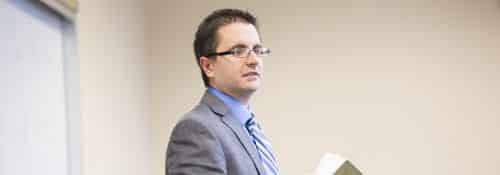
From Student to Teacher
Spotlight on Dr. Matthew Gaetano, ’05
Written by Chandler Lasch
Few can offer as fascinating a perspective as Dr. Gaetano when it comes to what it means to be not only a Hillsdale professor but a student as well. An ’05 graduate, Dr. Gaetano said that he was introduced to “the life of the mind” by his professors when he was a student at the College. His journey on the search for truth led to a desire to help others along a similar path of learning. By instructing his students and introducing them to important ideas they had not previously considered, he serves as both guide and companion.
Dr. Gaetano told me that it is “a beautiful thing to be able to play some small role in helping others become part of the same pursuit” and that he sincerely values his role as a teacher. For this reason, Dr. Gaetano’s favorite class to teach is Western Heritage, which is offered to incoming freshmen. As this is the first time many students encounter Plato, Aristotle, Cicero, and other significant historical figures in what he calls a “focused” and “serious” way, he enjoys watching and being a part of their discoveries. Dr. Gaetano also loves working with senior students as they discuss their theses with him, frequently on specific topics of which he is not as knowledgeable. Their friendships are thus able to grow as Dr. Gaetano becomes a fellow learner.
When I asked why it is important to study history, Dr. Gaetano referenced this quote by Cicero: “Not to know what happened before we were born is to remain perpetually a child.” He stressed the significance of becoming intellectual adults through the study of history as well as a need to “shed the crippling prejudice of presentism,” which is a bias that assumes things have always been the way they are now or that this present moment is the fulfillment of history, both of which prevent one from learning about the past.
Another important aspect of history that Hillsdale professors tend to emphasize as a whole is that it closely interacts with other fields of study. In fact, the intellectual historian’s ultimate goal is to be able to understand individual human beings and how they viewed themselves, their own world, and the challenges of their own day. Even if a history student goes on to study another subject such as philosophy or theology, Dr. Gaetano explains that an understanding of history will continue to supplement these studies, as “history prepares us to better understand the similarities and differences in the way humans lived their lives in their time in relation to our own.”
As we continued to discuss what makes Hillsdale and its history department unique, I was again struck by Dr. Gaetano’s passion for this College and the education he helps provide. He said that as an alumnus himself, he has not spoken with very many college graduates who think back on their university days with the same fondness that Hillsdale alumni do. He explained that Hillsdale students frequently think about their years here, especially the early years, as a kind of awakening in which they realize that there are so many things to learn and understand more deeply. They were not aware that such beautiful things even existed, let alone were worthy of being studied.
My conversation with Dr. Gaetano left me deeply moved by the insight he offered on what it means to study history here at Hillsdale. My own excitement about the noble pursuit of learning was re-ignited during our discussion about the academic journey and his role to guide students along the path.
 A resident of sunny Southern California, Chandler Lasch, ‘18, is currently studying history and theatre. She enjoys graphic design, iced hazelnut lattes, and Disney movies.
A resident of sunny Southern California, Chandler Lasch, ‘18, is currently studying history and theatre. She enjoys graphic design, iced hazelnut lattes, and Disney movies.